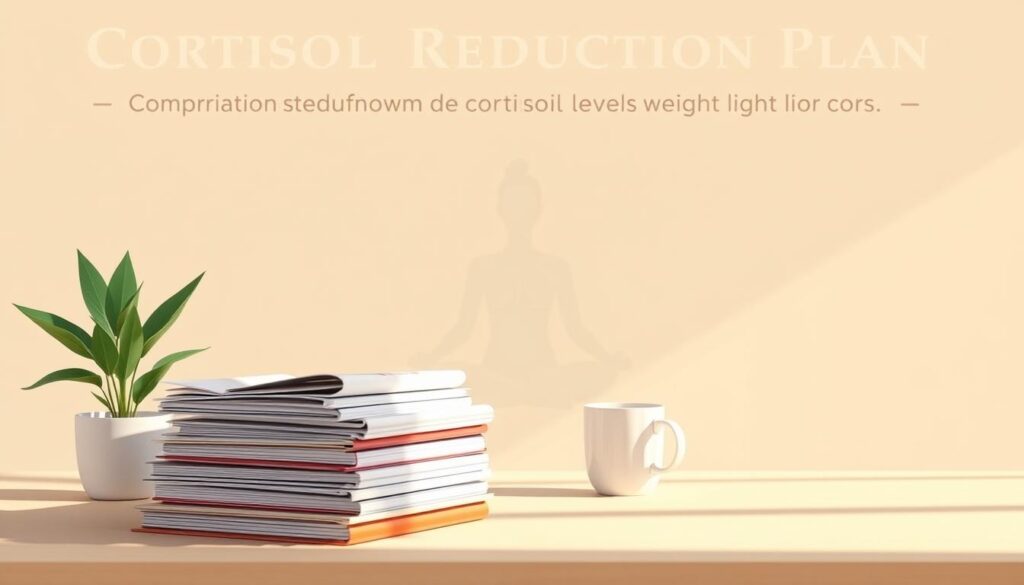How to Reduce Cortisol for Weight Loss
Are you having trouble losing weight even with a strict diet and exercise? or searching on internet about how to reduce cortisol for weight loss for You’re not alone. Many people struggle, and it often comes down to one significant factor: cortisol levels. High cortisol can make it hard to lose weight, making it very important to tackle.

Cortisol, the stress hormone, is key in how your body handles stress. When cortisol is too high, it can cause more fat to be stored around your belly. Learning how to manage cortisol levels is vital to reach your weight loss goals.
Key Takeaways
- High cortisol levels can make it hard to lose weight.
- Managing stress is key to controlling cortisol.
- Reasonable cortisol control can help with weight loss.
- A balanced lifestyle keeps cortisol levels healthy.
- Understanding cortisol’s role is crucial for managing its weight impact.
The Cortisol-Weight Connection
Cortisol, known as the “stress hormone,” affects weight management. Knowing how it works in your body is key to lowering cortisol levels naturally and losing weight.
What Is Cortisol and Its Normal Function
Cortisol is a hormone made by the adrenal gland. It helps your body deal with stress and controls blood sugar. It also helps break down fat, protein, and carbs.
Typically, cortisol levels go up in the morning and down at night. This follows a natural cycle.
How Elevated Cortisol Leads to Weight Gain
High cortisol levels can make you store more fat, especially around your belly. This is because cortisol helps your body store fat. It also makes you hungry, leading to overeating.
Common Signs Your Cortisol Levels Are Too High
Knowing the signs of high cortisol is essential. These signs can be physical or emotional/mental.
Physical Symptoms
- Rapid weight gain, especially in the belly
- Fatigue and trouble sleeping
- Issues with blood sugar
Emotional and Mental Indicators
- Feeling anxious and irritable
- Having trouble focusing
- Mood swings

You can start managing cortisol for weight loss by recognizing these signs and managing stress. This will also boost your overall health.
The Science Behind Cortisol-Related Weight Gain
Cortisol, the “stress hormone,” significantly impacts your body. It affects how you handle stress, metabolism, fat distribution, and weight.
Cortisol’s Effect on Metabolism and Fat Storage
Cortisol makes your body store more fat, especially around your belly. High cortisol levels make it hard to lose weight because your body stores fat as a stress response.

Belly Fat and Cortisol: The Visceral Connection
Visceral fat, the fat around your organs, is closely tied to cortisol. High cortisol levels can increase visceral fat. This is linked to health risks like heart disease and diabetes.
How Chronic Stress Creates a Weight Gain Cycle
Chronic stress can start a cycle of weight gain. High cortisol levels make you hungrier and crave unhealthy foods. This can lead to weight gain.
The Hunger Hormone Connection
Cortisol affects hunger hormones like ghrelin and leptin. High cortisol means more ghrelin and less leptin. This makes you hungrier and less complete.
Stress Eating and Cravings
Stress eating occurs every day when cortisol is high. You might crave comfort foods high in sugar and fat, which can lead to eating more calories and gaining weight.
| Factor | Effect of High Cortisol |
| Metabolism | Promotes fat storage, especially around the abdomen |
| Hunger Hormones | Increases ghrelin, decreases leptin |
| Eating Behavior | This leads to stress eating and cravings for high-calorie foods |
Knowing how cortisol affects weight is key to losing weight. You can stop weight gain and reach your goals by managing cortisol with a cortisol-reduction diet and stress-reducing methods.
How to Reduce Cortisol for Weight Loss: A Comprehensive Approach
To lose weight, you need to tackle cortisol levels from all angles. This means changing your diet, exercising, and learning to handle stress better.
Setting Realistic Goals for Cortisol Management
Setting goals is key when trying to lower cortisol. Remember, it’s a slow process that takes time and effort. Start with small steps like short meditation sessions or eating more anti-inflammatory foods.
Measuring Progress Beyond the Scale
Don’t just look at the number on the scale. Watch how your energy, mood, and overall health change. These signs can tell you if your plan is working.
Creating Your Personalized Cortisol-Reduction Plan
To make a plan that works for you, determine what stresses you out and how it affects your cortisol.
Identifying Your Stress Triggers
Begin by keeping a journal of your stressors. Look for patterns and what makes your cortisol go up. Common culprits include work stress, not enough sleep, and certain foods.
Balancing Quick Wins with Long-Term Strategies
It’s easy to want quick fixes, but lasting results come from a mix of short-term and long-term plans. Use quick stress-relievers like deep breathing alongside long-term habits like regular exercise and healthy eating.

Setting realistic goals, tracking your progress, and making a plan that fits you can lower cortisol and help you reach your weight loss goals.
Nutrition Strategies to Combat High Cortisol
What you eat can help lower cortisol levels. A good diet can reduce cortisol’s effects and aid in weight loss.
Anti-Inflammatory Foods That Lower Cortisol
Eating anti-inflammatory foods can lower cortisol. These foods are full of nutrients and antioxidants that fight inflammation.
Omega-3 Rich Foods
Omega-3 fatty acids in salmon, sardines, and walnuts are anti-inflammatory. Adding these to your diet can lower cortisol.
Antioxidant Powerhouses
Foods like berries and leafy greens are full of antioxidants. They help fight oxidative stress, which can raise cortisol.

The Cortisol-Reduction Diet Plan
A diet to reduce cortisol focuses on whole foods. Avoid processed and sugary foods that raise cortisol.
| Food Group | Examples | Benefits |
| Fruits | Berries, citrus fruits | High in antioxidants, fiber |
| Vegetables | Leafy greens, broccoli | Rich in vitamins, minerals |
| Protein Sources | Fatty fish, nuts, seeds | High in omega-3s, healthy fats |
Strategic Meal Timing for Hormonal Balance
Eating at the correct times can balance hormones. Start with a balanced breakfast and avoid eating late at night.
Foods to Avoid That Spike Cortisol
Some foods can increase cortisol. Limit or avoid processed snacks, sugary drinks, and foods with saturated fats.
Following these nutrition tips can help you manage cortisol and weight loss. A balanced diet and lifestyle changes can lead to lasting weight loss and better health.
Exercise Approaches for Optimal Cortisol Balance
Exercise is key in reducing cortisol for weight loss. But, the type and intensity of workouts are essential. Regular activity can lower cortisol, but finding the right balance is crucial to avoid raising it.
Low-Intensity Workouts That Reduce Cortisol
Low-intensity exercises like yoga, walking, and light swimming are great for lowering cortisol. These activities help relax and reduce stress effects.
- Yoga: Combines physical postures, breathing techniques, and meditation to reduce stress.
- Walking: A simple, accessible way to lower cortisol and improve overall health.
- Swimming: Provides a low-impact, full-body workout that can be very relaxing.
Strength Training for Hormonal Health
Strength training is also practical in managing cortisol levels. Building muscle improves metabolic health and stress handling.
- Focus on compound exercises like squats, deadlifts, and bench presses.
- Aim for 2-3 strength training sessions per week.
Finding Your Exercise Sweet Spot
Finding an exercise routine that suits you is key. Avoid overdoing it, as it can raise cortisol levels.
Signs Your Workout Is Raising Cortisol
Watch for these signs that your workout might be too intense:
- Prolonged muscle soreness
- Increased fatigue
- Irritability or mood swings
Recovery Practices to Prevent Exercise-Induced Stress
Recovery is essential. Rest well, eat a balanced diet, and use recovery techniques like foam rolling or stretching.

By mixing low-intensity workouts with strength training and listening to your body, you can manage cortisol levels, which can support your weight loss journey.
Stress Management Techniques for Cortisol Control
It’s key to use stress management techniques every day to lower cortisol naturally. Chronic stress can raise cortisol levels, making it hard to lose weight and stay healthy. You can manage stress, lower cortisol, and help with weight loss by choosing the right strategies.
Mindfulness and Meditation Practices
Mindfulness and meditation are great for managing stress and lowering cortisol. Regular practice calms the mind, reduces anxiety, and boosts well-being.
5-Minute Meditation for Immediate Cortisol Reduction
A 5-minute meditation can significantly lower cortisol levels. Sit comfortably, close your eyes, and focus on your breath. If your mind wanders, gently bring it back to your breathing. This easy practice can be done anywhere, making it a handy stress management tool.
Building a Consistent Mindfulness Routine
Being consistent is crucial for mindfulness and meditation. Start with short sessions and increase the time as you get more comfortable. Adding mindfulness to your daily routine can profoundly impact your stress levels and health.
Breathing Exercises for Stress Response Regulation
Breathing exercises are also practical for managing stress and regulating cortisol. Techniques like diaphragmatic breathing calm the nervous system and reduce stress.
- Diaphragmatic Breathing: Expand your belly as you inhale, not your chest. This breathing slows your heart rate and promotes relaxation.
- 4-7-8 Breathing: Inhale for four counts, hold for 7, and exhale for 8. This technique reduces anxiety and brings calm.
Cognitive Behavioral Strategies for Stress Management
Cognitive behavioral strategies help manage stress by changing how you respond to stressful situations. Techniques like cognitive restructuring and problem-focused coping are very effective.
- Identify Negative Thought Patterns: Notice your thoughts and spot patterns that cause stress.
- Challenge and Reframe Negative Thoughts: Swap negative thoughts for more positive, realistic ones.
Nature Therapy and Outdoor Activities
Being in nature deeply affects stress levels and cortisol control. Walking, hiking, or just being in a park or garden reduces stress and boosts well-being.
Adding stress management techniques to your daily routine can lower cortisol levels, support weight loss, and improve your health.
Sleep Optimization for Healthy Cortisol Rhythms
Sleep is key to managing stress and weight. Lack of quality sleep leads to more cortisol, which causes stress and weight gain.
Understanding the Cortisol-Sleep Cycle
The link between cortisol and sleep is complex. Cortisol levels should rise in the morning and fall at night. But, disruptions can raise cortisol, impacting your health and weight.
Creating a Sleep Sanctuary
Make your bedroom a sleep haven. It should be calm, dark, and quiet. A good mattress and pillows also help sleep quality.
Evening Routines That Lower Nighttime Cortisol
A calming pre-sleep routine can lower cortisol. This includes:
- Reading or listening to soothing music
- Practicing gentle stretches or yoga
- Meditating or practicing deep breathing exercises
Digital Detox Strategies
Stay off screens for at least an hour before bed. Blue light can mess with melatonin, a sleep hormone.
Relaxation Techniques for Better Sleep
Try progressive muscle relaxation, mindfulness meditation, or guided imagery. They calm your mind and body for sleep.
Addressing Sleep Disorders That Affect Cortisol
If you have sleep disorders like insomnia or sleep apnea, get help. Untreated disorders can harm cortisol levels, leading to weight gain and health problems.
Focus on sleep and use these strategies to control cortisol. This supports your weight loss and overall health.
Supplements and Natural Remedies for Cortisol Reduction
Diet and exercise are key, but supplements and natural remedies can help, too. They can manage stress and cortisol levels. This adds to the lifestyle changes we talked about earlier.
Adaptogenic Herbs for Stress Management
Adaptogenic herbs help your body handle stress better. Some top herbs for managing cortisol are:
- Ashwagandha: Known for its ability to reduce stress and anxiety.
- Rhodiola Rosea: Helps combat fatigue and improve mental performance.
- Ginseng: Enhances energy levels and reduces inflammation.
Essential Vitamins and Minerals for Adrenal Health
Vitamins and minerals are vital for adrenal health and cortisol management. Key nutrients include:
| Nutrient | Role in Cortisol Management |
| Vitamin C | It supports adrenal function and reduces oxidative stress. |
| Magnesium | It helps regulate cortisol production and promotes relaxation. |
| Potassium | Essential for maintaining healthy adrenal function. |
When and How to Use Supplements Safely
Always talk to a healthcare provider before starting supplements. This avoids potential interactions and side effects.
Potential Interactions and Side Effects
Some supplements can affect medications or cause side effects. For instance, ashwagandha might interact with thyroid meds. Ginseng can lead to insomnia if taken too late at night.
Working with Healthcare Providers
A healthcare provider can tailor a supplement plan for you. This ensures safe and effective use.
Conclusion: Your Sustainable Path to Lower Cortisol and Weight Loss Success
You now know how cortisol affects weight gain and have tools to manage it for weight loss. You can stop chronic stress and weight gain by following a cortisol-reducing diet and making lifestyle changes.
Managing cortisol requires a long-term commitment to healthy habits. These include eating well, exercising regularly, managing stress, and sleeping well. By doing these things every day, you’ll get closer to a healthier weight and better well-being.
Remember, small changes can lead to significant results over time. Focus on making progress, not being perfect. Celebrate your successes. Dedication and patience can keep cortisol levels healthy and help you reach your weight loss goals.
FAQ:
What are some practical ways to lower cortisol levels naturally?
To naturally lower cortisol, try stress management techniques like mindfulness and meditation. Eat a balanced diet with whole foods, omega-3s, and antioxidants. Getting enough sleep is also key.
How does diet impact cortisol levels and weight loss?
Eating anti-inflammatory foods like omega-3s and antioxidants can help. Avoid sugary and processed foods that raise cortisol. Making wise food choices can manage cortisol and aid in weight loss.
Can exercise help reduce cortisol levels, and if so, what types are most effective?
Yes, exercise can lower cortisol. Try low-intensity activities like yoga, walking, and strength training. Find what works for you, and include rest to avoid stress.
How can I manage stress to lower cortisol levels?
Manage stress with mindfulness, meditation, and cognitive strategies. Nature therapy and outdoor activities also help regulate cortisol.
Are there any supplements that can help reduce cortisol levels?
Supplements like ashwagandha and rhodiola can help with stress and cortisol. However, to avoid side effects, use them safely and talk to a healthcare provider.
How does sleep impact cortisol levels, and what can I do to improve my sleep?
Sleep is vital for cortisol regulation. Create a sleep-friendly environment, follow a calming evening routine, use relaxation techniques, and maintain a consistent sleep schedule.
What are some common signs that my cortisol levels are too high?
High cortisol can cause weight gain, fatigue, insomnia, and mood swings. If you notice these, see a healthcare provider for advice.
How can I measure progress in reducing cortisol levels and achieving weight loss?
Track progress by noticing energy boosts, mood improvements, and less inflammation. Regular cortisol tests can also show if your efforts are working.
Read More





